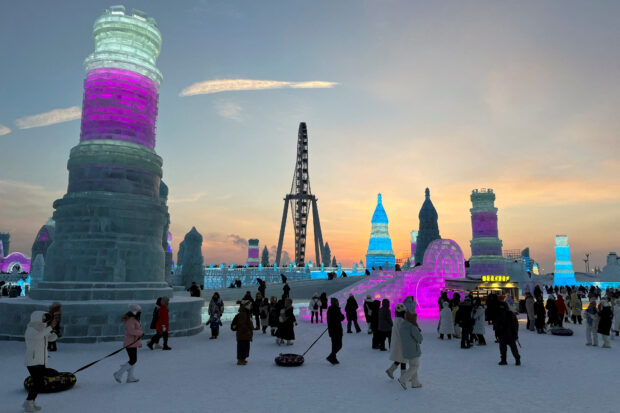China’s Xinjiang battles harshest cold spell in over six decades

Visitors walk past ice sculptures at the Harbin Ice and Snow Festival in Harbin, Heilongjiang province, China December 24, 2023. REUTERS FILE PHOTO
BEIJING — Temperatures broke a 64-year-old record in China’s far western region of Xinjiang, plunging to a bone-chilling minus 52.3 degrees Celsius (minus 63.4 degrees Farenheit) amid a cold spell and traffic disruptions following the Lunar New Year holiday.
Several parts of China are battling another deep freeze as people return from week-long celebrations of the year’s biggest holiday. Just before it started, blizzards and icy rain had stranded travelers on railways and roads.
State media said Sunday’s milestone in the Tuerhong township of Fuyun county was the lowest since records began in Xinjiang, surpassing a temperature of minus 51.5 C (minus 60.7 F) set on Jan. 21, 1960.
READ: Cold wave grips northern China as temperatures in south plummet
The figure was just shy of the lowest national temperature of minus 53 C (minus 63.4 F) in Mohe, a city in the northeastern province of Heilongjiang on Jan. 22 last year.
Through several days of cold and snow, 853 km (530 miles) of roads have been affected in the region’s area of Altay, broadcaster CCTV said. That spurred highway authorities to send 47 vehicles and 86 rescuers to remove snow overnight.
Transport ministry figures show the regions of Inner Mongolia and Xinjiang, along with the provinces of Liaoning, Jilin and Heilongjiang have closed 43 sections of road and 623 toll stations, CCTV said on Monday.
National weather authorities raised the warning for freezing weather conditions to its second highest level, the Global Times newspaper said, with drastic falls expected across the nation through Thursday.
READ: China expects searing heat, more weather extremes in 2024
The most severely affected areas will include parts of Inner Mongolia, northeastern China, the central province of Hubei and Hunan in the south, it added.
China’s extreme weather over the last year has ranged from sandstorms to torrential rain and record-breaking searing heat over the summer, as well as several typhoons.
Over the weekend, severe sandstorms blanketed several cities in the region of Ningxia Hui, including its capital of Yinchuan.